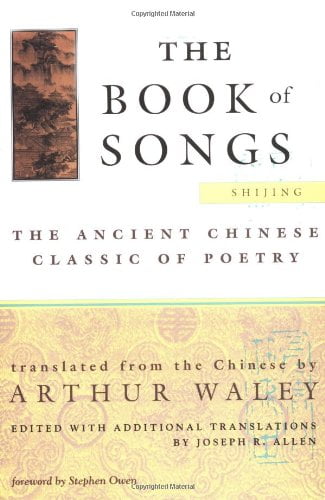
In amongst the many worthy I Ching tomes on my shelves is a modest paperback of poetry – offering more inspiration for readings than most of them. The Shijing is the classic book of songs, just as the Yijing (I Ching) is the classic book of change. Among them are the songs of the same Zhou people who first used and recorded the I Ching – and the later songs still evoke the same daily lives and beliefs that form the language of its imagery and advice.
It’s impossible to read far into the Book of Songs without finding it deepening and changing your understanding of the I Ching. ‘De’, for instance, that very moral ‘virtue’ of the Daxiang, was a personal ‘magic’ that you strengthened with wine. Fish (like the ones in Hexagram 61 and the lines of 44) appear everywhere as signs of great good fortune. The eighth month (as in Hexagram 19) is the time for harvest, for cutting gourds and drying dates.
Then there is the occasional echo that makes you jump. Just one example:
Hexagram 63, with its lines about a great Shang king and later Zhou supremacy, has the lines:
‘At the beginning good fortune,
At the end disorder.’
And Ode 255, where King Wen of the Zhou challenges the Shang, begins:
‘Heaven gives birth to the multitudes of the people,
But its charge cannot be counted upon.
To begin well is common;
To end well is rare indeed.’
This is undoubtedly a wonderful resource if you want to make your own discoveries and reach your own conclusions about the roots of the I Ching. It’s also an unparalleled opportunity to immerse yourself in its world. But you’ll want to pick it up and read it because of the poetry – the love songs especially can be startlingly direct, in celebration or in lament:
‘Moon in the east!
This lovely man
Is in my bower,
Is in my bower,
His foot is upon my threshold.’
‘If along the highroad
I caught hold of your cuff,
Do not hate me;
Old ways take time to overcome.If along the highroad
I caught hold of your hand,
Do not be angry with me;
Love takes time to overcome.’
You can get hold of a copy of the Book of Songs in Legge’s translation online, along with the Chinese text. But I’d still recommend buying the book! Apart from being easier to browse and read, and a much more evocative, poetic translation, this edition includes valuable notes explaining the rituals, history and traditions behind the poems. There’s also a foreword surveying the culture behind the poetry, and a wonderful essay on the ‘literary history’ of the Shijing, which describes how the classic text coalesced out of oral tradition.
‘I climb that bare hill
And look toward where my mother is.
My mother is saying, “Alas, my young one is on service;
Day and night he toils.
Grant that he is being careful of himself,
So that he may come back, and not be cast away.” ‘


